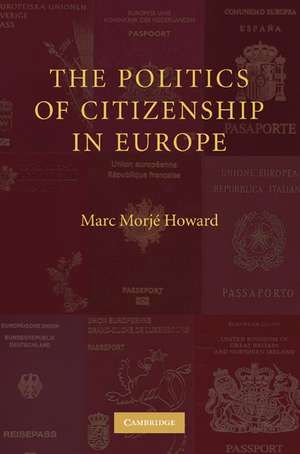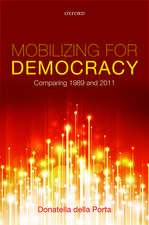The Politics of Citizenship in Europe
Autor Marc Morjé Howarden Limba Engleză Paperback – 6 sep 2009
| Toate formatele și edițiile | Preț | Express |
|---|---|---|
| Paperback (1) | 223.29 lei 6-8 săpt. | |
| Cambridge University Press – 6 sep 2009 | 223.29 lei 6-8 săpt. | |
| Hardback (1) | 598.46 lei 6-8 săpt. | |
| Cambridge University Press – 6 sep 2009 | 598.46 lei 6-8 săpt. |
Preț: 223.29 lei
Nou
Puncte Express: 335
Preț estimativ în valută:
42.73€ • 44.52$ • 35.38£
42.73€ • 44.52$ • 35.38£
Carte tipărită la comandă
Livrare economică 03-17 aprilie
Preluare comenzi: 021 569.72.76
Specificații
ISBN-13: 9780521691277
ISBN-10: 0521691273
Pagini: 258
Ilustrații: 12 b/w illus. 9 tables
Dimensiuni: 156 x 234 x 14 mm
Greutate: 0.39 kg
Editura: Cambridge University Press
Colecția Cambridge University Press
Locul publicării:New York, United States
ISBN-10: 0521691273
Pagini: 258
Ilustrații: 12 b/w illus. 9 tables
Dimensiuni: 156 x 234 x 14 mm
Greutate: 0.39 kg
Editura: Cambridge University Press
Colecția Cambridge University Press
Locul publicării:New York, United States
Cuprins
Introduction; Part I. Argument: 1. Citizenship in cross-national perspective: an empirical baseline in the EU-15; 2. Historical variation and legacies: the impact of colonialism and early democratization; 3. Continuity and change in the contemporary period: the impact of public mobilization; Part II. Cases: 4. Liberalizing change: Sweden, Finland, Luxembourg, the Netherlands, and Portugal; 5. Restrictive continuity: Austria, Denmark, Italy, Spain, and Greece; 6. Partial liberalization with a restrictive backlash: Germany; 7. Citizenship battles in the historically liberal countries: France, Belgium, the United Kingdom, and Ireland; 8. The new European frontier: the 12 Accession countries;Conclusion; Appendix I; Appendix II.
Recenzii
'Howard's illuminating new book studies the politics of citizenship, using a broad comparative approach. He provides a provocative analysis of liberalization in citizenship policy that will be a timely addition to the growing literature on citizenship in general and European Union studies in particular.' Seyla Benhabib, Yale University
'Marc Howard is one of a handful of scholars who takes the empirical study of citizenship policy seriously. In contrast to the many studies indulge in tedious moralizing, Howard provides a truly comparative study of citizenship across Europe, one that draws on both historical and quantitative analysis. His argument - that citizenship trajectory is a function of colonial legacies and party politics - is clear, elegant, and thoroughly convincing. This outstanding book is required reading for anyone interested in citizenship, immigration, or contemporary European Politics.' Randall Hansen, University of Toronto
'Marc Howard's excellent new book pushes citizenship to the center-stage of comparative politics. Crisply clear yet highly nuanced, the book provides compelling explanations of why some European states have recently liberalized their citizenship laws and why some others have not. Howard's skillful combination of quantitative and qualitative methods is social science at its best.' Christian Joppke, The American University of Paris
'This is the most important book on the politics of citizenship in Europe to appear in many years. Marc Howard examines two questions about citizenship policy that have intrigued several generations of social scientists: how can we account for differences among countries at similar levels development; and how can we account for changes in well-established policies? By combining case studies with a cross-national analysis of fifteen European countries, Howard develops an original, comparative and comprehensive approach for understanding the politics of citizenship.' Martin Schain, New York University
'Many authors have described and criticized European citizenship laws and policies. Marc Morjé Howard measures and explains them. Here is finally an analysis of persistent differences and common trends across the European Union based on state-of-the-art comparative political science.' Rainer Bauböck, European University Institute
'… the most intelligent book on the subject to date. … This volume is well worth the money and the time. It is well written, makes important contributions, and clarifies the direction for future research.' European Union Studies Association Review
'… demonstrates the extensive implications of the growing and potentially volatile issue of citizenship policies and immigrant integration. This empirical study of citizenship policy enables a comparative as well as quantitative analysis of citizenship policies across the European countries … represents a valuable resource for other scholars researching this emerging issue, as well as for policy analysts and policy makers coming from the countries that are subject to analysis and from other countries.' CEU Political Science Journal
'Marc Howard is one of a handful of scholars who takes the empirical study of citizenship policy seriously. In contrast to the many studies indulge in tedious moralizing, Howard provides a truly comparative study of citizenship across Europe, one that draws on both historical and quantitative analysis. His argument - that citizenship trajectory is a function of colonial legacies and party politics - is clear, elegant, and thoroughly convincing. This outstanding book is required reading for anyone interested in citizenship, immigration, or contemporary European Politics.' Randall Hansen, University of Toronto
'Marc Howard's excellent new book pushes citizenship to the center-stage of comparative politics. Crisply clear yet highly nuanced, the book provides compelling explanations of why some European states have recently liberalized their citizenship laws and why some others have not. Howard's skillful combination of quantitative and qualitative methods is social science at its best.' Christian Joppke, The American University of Paris
'This is the most important book on the politics of citizenship in Europe to appear in many years. Marc Howard examines two questions about citizenship policy that have intrigued several generations of social scientists: how can we account for differences among countries at similar levels development; and how can we account for changes in well-established policies? By combining case studies with a cross-national analysis of fifteen European countries, Howard develops an original, comparative and comprehensive approach for understanding the politics of citizenship.' Martin Schain, New York University
'Many authors have described and criticized European citizenship laws and policies. Marc Morjé Howard measures and explains them. Here is finally an analysis of persistent differences and common trends across the European Union based on state-of-the-art comparative political science.' Rainer Bauböck, European University Institute
'… the most intelligent book on the subject to date. … This volume is well worth the money and the time. It is well written, makes important contributions, and clarifies the direction for future research.' European Union Studies Association Review
'… demonstrates the extensive implications of the growing and potentially volatile issue of citizenship policies and immigrant integration. This empirical study of citizenship policy enables a comparative as well as quantitative analysis of citizenship policies across the European countries … represents a valuable resource for other scholars researching this emerging issue, as well as for policy analysts and policy makers coming from the countries that are subject to analysis and from other countries.' CEU Political Science Journal
Notă biografică
Descriere
In this book, Marc Morjé Howard addresses immigrant integration, exploring the far-reaching implications of one of the most critical challenges facing Europe.
















